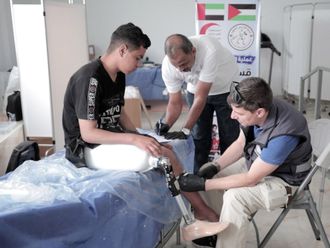Dubai: Being too clean could be the reason why so many people in the UAE are suffering from allergies.
Doctors and nutritionists in Dubai have confirmed a rise in the number of people complaining from allergies with ‘hygiene hypothesis’ being the main theory behind the allergies.
The Union Medical Centre in Karama has seen an average of 10 to 12 patients a day suffering from allergy cases in December, while the Dubai Herbal Treatment Centre in Dubai has recorded an estimated 60 to 80 patients visiting the centre every month complaining of food allergies alone.
Allergies are specific and recurring unpleasant immune responses that are triggered by natural substances such as foods, pollens or other influences in our surroundings. With different kinds of allergies on the rise, Gulf News spoke to nutritionist Victoria Tipper at Dubai Herbal Treatment Centre to find out the reason.
While there are still uncertainties regarding the exact cause of allergies, the hygiene hypothesis theory looks at how increased levels of hygiene and the overuse of antibiotics may affect allergies, explained Tipper.
The theory maintains due to excessive cleanliness our immune system is not allowed to fully mature as it should when we are children. “We are no longer being exposed to infectious bacteria, parasites and other microorganisms such as the good bacteria needed for a healthy gut, because everything around us is so clean,” said Tipper. She pointed out that what many people may not know is that in order for our immune system to fully develop into a less allergic system, we need exposure to microbes.
Being overly hygienic however, is not the only reason behind developing an allergy.
Usually, the body’s immune system fights against foreign bodies such as bacteria and viruses to keep it safe. However, people with allergies have a hypersensitive immune system, which treats the substance they are allergic to (the allergen) as a foreign body, producing antibodies such as immunoglobulin E (IgE), explained Tipper. “These antibodies (IgE) then attach to mast cells in the body and this causes a release of certain chemicals such as histamines, which causes the symptoms of an allergic response,” she said.
A recent study also claimed an increase in pesticide residues might be contributing to the rising number of food allergies. “The chemicals found in pesticides may promote allergies by weakening the tolerance of some foods,” said Tipper.
Our modern way of life including fast food, high sugar and processed foods has moved away from the traditional diet of our ancestors, playing a role in the rising incidence of allergies. Unhealthy diets combined with overuse of medications such as antibiotics and pain killers, along with chronic stress have all wreaked havoc on the natural bacterial flora of our guts, said Tipper. “Eighty per cent of the immune system is located in the gut, so promoting digestive health is paramount not only for allergies but for all diseases.”
Another theory suggests environmental pollution may play a role in causing allergies. This can be seen in the UAE where increasing urbanisation is resulting in more pollution, said Tipper.
Genetic or developed?
While environmental factors along with substances in our surroundings can impact our immune systems, suffering from an allergy could be genetic. Tipper said that a study on twins found that 64 per cent of identical twins had the same allergy. “Having parents with allergies will also make a child more susceptible to developing allergies, but they don’t necessarily need to be the same allergy,” she said.
Other studies have found gender specific genetic links to inherited allergies. Tipper pointed out that one study showed mothers with allergic eczema were 50 per cent more likely to have a daughter who develops allergic eczema and fathers with allergic eczema were 50 per cent more likely to have a son who develops allergic eczema.
Whether hygiene related, genetic or caused by pesticides, food allergies are normally developed in childhood, but can also begin at any age placing everyone under risk. Tipper advised parents to clean-up their diets by staying away from processed foods, and to drink out of glass bottles instead of plastic bottles.
She also recommends parents and children spend more time out in the open to get enough vitamin D through sun exposure. “For mothers, I would also say don’t clean up too much at home and perhaps get a pet in order to strengthen your children’s immune system.”











